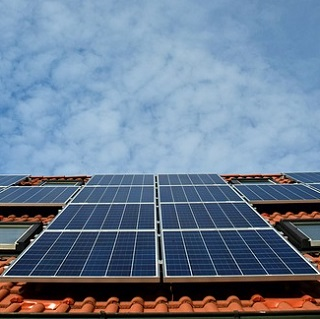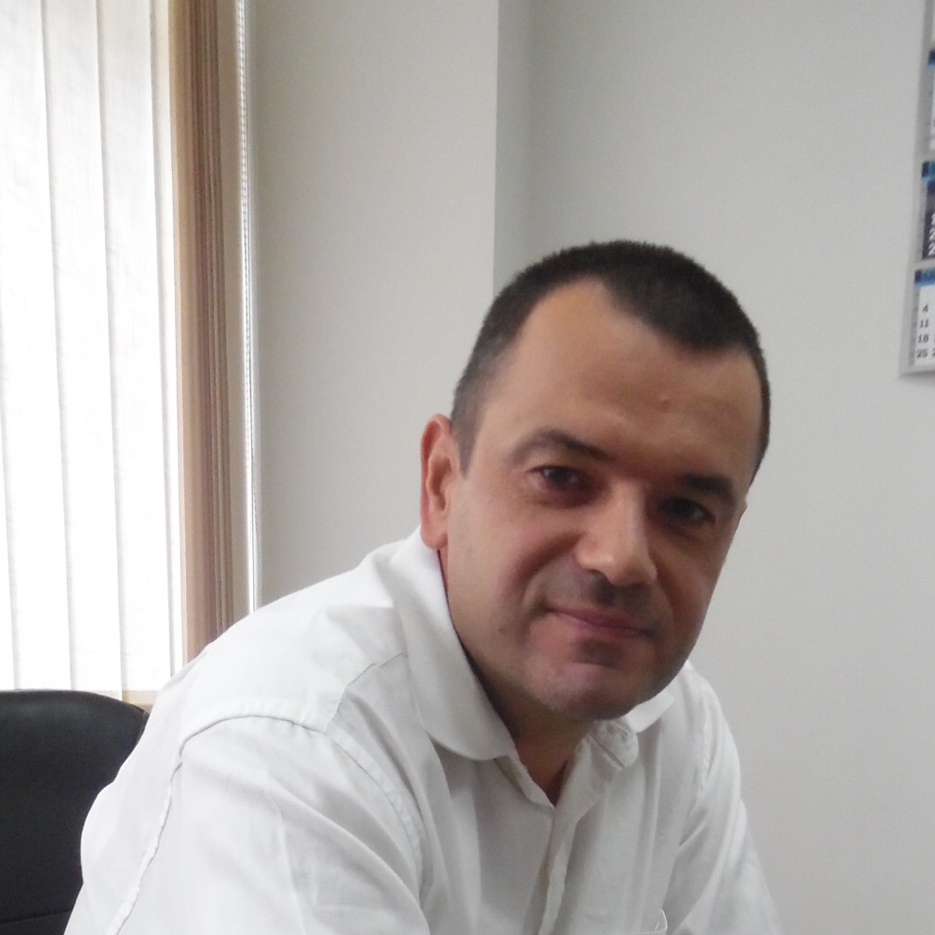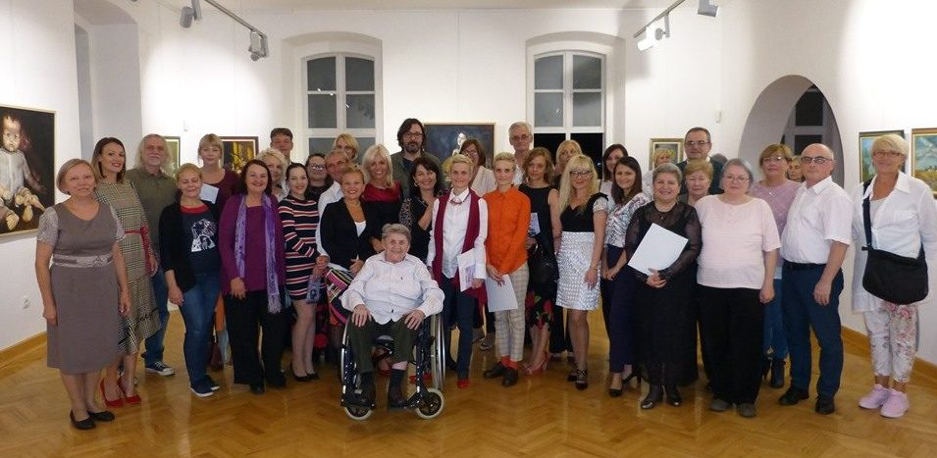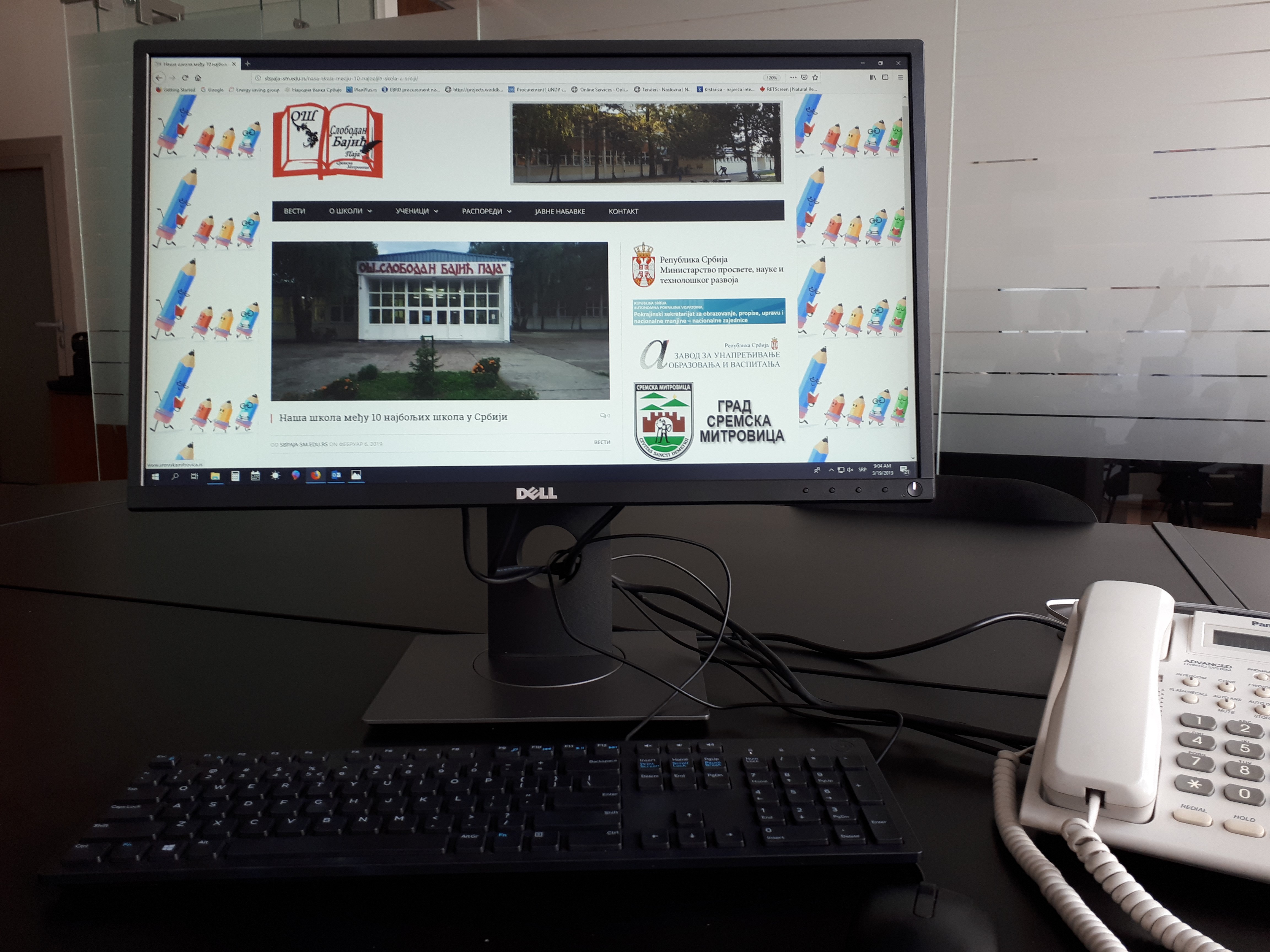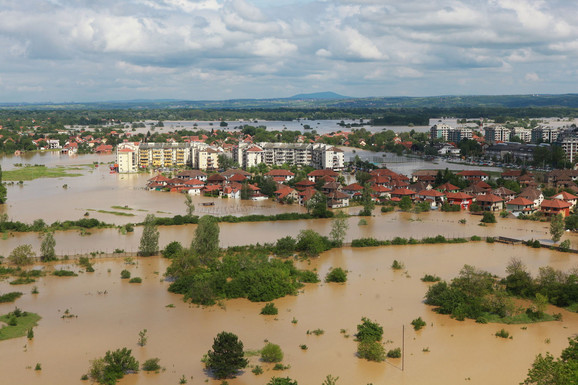The goal of this project is determining the optimal structure of internal 35 kV cable network of wind farm “VETROZELENA” including defining number of necessary cable feeders, list of generators connected to each feeder, the feeder route tracing from the first connected generator to the 35/400 kV/kV transformer station, and the list of lengths and diameters of all cable sections of all feeders.
The total discounted costs during the 25-year long life span have been used as optimisation criteria including:
-
Investment costs of 35 kV network, 400 kV overhead line and the 35/400 kV/kV transformer station including all required equipment and works
-
Sum of discounted annual costs of losses in the above listed network elements (power losses) at a predefined discount rate
-
Sum of discounted annual costs of wind farm maintenance at a predefined discount rate
The analysis was done for the defined connection point and included at least 20 different internal cable network routes as well as several different additional voltage transformations.
The Scope of Work of the project contained the following activities:
-
Site visit, identification and analysis of the current site conditions including possibilities for connection of the PV plant to the distribution or transmission system
-
Analysis of the existing legal and regulatory framework for construction of PV plants in Serbia with the recommendation of a legal roadmap for the project development
-
Market analysis both related to procurement of equipment and works and to selling generated electricity and guarantees of origin
-
Technical analysis including disposition of PV panels and calculation of the possible capacity, expected annual gross power generation and expected internal losses assuming that PV plant is constructed with fixed PV panels as well as assuming that PV panels have the tracking possibility i.e., that they are adjustable around an axis
-
Preliminary Environmental Impact Assessment of the PV plant
-
Financial analysis, including calculation of all investment and operational costs as well as expected revenue for both technical variants of the PV plant, the pay-back period, internal rate of return, ratio of total present value of the annual revenue and expenses and expected total present value of the profit during lifetime of the PV plant, and recommendation of the best investment decision for the investor
-
Sensitivity analysis of the recommended technical concept in order to determine whether the proposed technical solution remains economically justified in case of changing of some of significant parameters like investment costs, lifetime, discount rate and market prices of electricity and guarantees of origin
The purpose of the Serbia Energy Security Activity is to address the lack of incentives and investments for renewable energy (RE) and energy efficiency (EE), inefficient use of energy resources, the low level of renewables in strategies.
The Overall Scope of Work for the Energy Security Activity is as follows:
OBJECTIVE 1: IMPROVED ENERGY EFFICIENCY AT THE MUNICIPAL LEVEL
This objective addresses both the demand and supply sides of the energy equation. It works on improving the efficiency of DHP operations as well as improving the efficiency of multi-apartment buildings, thus making savings on the amount of available fuel in the system and in the cost to the end users.
OBJECTIVE 2: INCREASED USE OF RENEWABLE ENERGY RESOURCES
This objective will support the expansion of the use of RE including solar power in residential buildings and SMEs. One area of focus will be the development and establishment of net metering as an accepted practice and at the provision of recommendations on policy, legal and regulatory framework and standards governing net metering in Serbia.
ESG will primarily provide technical expertise in regulatory framework reform. ESG will contribute:
-
Legal and Regulatory Framework for increased use of RE improved
Landscape analysis of Serbian compliance with EU regulations in the energy sector, provision of technical assistance to government actors to review, draft, and promote necessary changes to the legal, regulatory and taxation environment to facilitate RE solutions.
-
Net metering and related policies introduced and a roadmap for implementation is approved
Written analysis of strategies, policies, and regulations needed to support net metering and expansion of renewable energy development; assist in drafting the relevant bylaws for net metering policy for the new Law on Renewables, which was adopted in March 2021. Ensure coordination of information exchange and collaboration between stakeholders and implementing organizations in the development of net metering policies.
-
Modern RE technologies – including in forecasting and energy management - introduced and utilized
Support private sector businesses involved in the development or installation of renewable energy technologies.
As the Serbian government emphasizes the importance to increase energy efficiency, it has passed crucial reforms during the last two decades. The general strategic framework is set out by the Energy Sector Development Strategy of the Republic of Serbia for the period by 2025 with projections by 2030. In accordance with this strategic document, since 2001, German Development Bank, KfW, and the Republic of Serbia represented by the Ministry of Mining and Energy, MoME, have been running rehabilitation programs of the District Heating Sector in Serbia that are focused on sustainable and efficient heat generation, decreasing of heat losses in the heat distribution network and demand side management.
ESG was responsible for performing the following activities:
-
Inspect existing and new planned facilities and sites. Collect all available information
-
Analyse and evaluate existing studies, proposed measures for rehabilitation of DH boiler plants, equipment, distribution pipelines and heating substations
-
Preparing investment plans for select DH companies, including related costs, benefits and priorities
-
Review and approve contractors design of work
-
Perform site supervision on a permanent on-site basis, supervise work of contractors on construction of facilities, review contractors claim
-
Control of work schedule, prepare progress reports, the quality of works and compliance with environmental, social requirements
-
Inspection of contractor(s) compliance with applicable environmental, social and EHSE requirements
-
EHSE monitoring (together with the HSE-Expert) during the whole construction and implementation phase
-
Participation in FAT and equipment delivery inspections
-
Incidental services during the Defect Liability Period and in the event of Contractor claims
-
Review commissioning programs, attend commissioning tests and prepare reports
-
Review and approval of as-built documents
-
Implementation of the web-site for this Project
The overall of Biomass Project were inter alia contributed to establishing the required legal and
institutional framework needed for development of the biomass market. In addition, project provided an
investment support grant mechanism (ISGM) for private investments with the aim to realize up to 6-8
biomass/biogas fired combined heat and power plants (CHP). Additional 12 similar projects were
technically prepared in terms of elaboration of the feasibility studies and technical documents.
Complementary activities included a number of training activities for municipalities, investors and
banks, as well as capacity building and planning activities at national and local level.
The objective of EE Project was to introduce and support the implementation of municipal Energy
Management Systems (EMS), including Energy Management Information Systems (EMIS), throughout Serbia to
increase the EE investments in public buildings and municipal services and to facilitate their more
energy efficient operation in general. EE Project was fully in line with the provisions of the Law on
Efficient Use of Energy which stipulates establishing of an EMS in Serbian municipalities and therefore
will contribute its implementation.
ESG participated in implementation of the following sub-assignments and was responsible for the
following activities:
-
Sub-assignment 4: Technical expertise in field of renewable energy
(The main purpose of this assignment was to identify existing barriers for construction of
biogas fired power plants, particularly related to: acquiring the right to construct the plant
i.e. obtaining od the construction permit and acquiring the approval for connection of the plant
to energy network.)
-
Sub-assignment 5: Reducing Barriers to Accelerate the Development of Biomass Markets in
Serbia
(Perform the analysis of national incentives measures and activities in competence of the
Ministry of Agriculture, Forestry and Water Management in view of investments in renewable
energy (RE) projects in agriculture; Elaborate the Guide for investments in agricultural
holdings/enterprises for the construction of RE facilities in line with the content and
provisions of the IPARD Programme, as well as of the relevant laws and by-laws; Capacity
building for representatives of local self-governments and Government (including representatives
of Agriculture Extension Services) and agricultural producers)
-
• Sub-assignment 7: Removing Barriers to Promote and Support Energy Management Systems in
Municipalities throughout Serbia
(Elaboration of Guidebook for procurement of electricity and electricity cost optimization in
public buildings and facilities to be adopted by the MME and recommended to all public budget
users (content of Guidebook: General Information on Electricity Market in Serbia, Final
electricity customers, Cost optimization, Public procurement of electricity, Electricity and/or
cost saving measures, Check list and algorithm for analysing potential for cost optimization and
implementation of energy and/or cost saving measures);
The aim of the assignment is to review EBS’ current ESMS and E&S due diligence activities and, if
needed, improve them to a level that will enable the bank to achieve the following objectives:
-
(Better) understand the environmental and social risks in its portfolio;
-
Evaluate, mitigate and monitor these risks on a structural basis
-
Comply with KfW’s conditions to ensure funding and business possibilities
-
Identify potential financing opportunities
-
Achieve a good reputation among clients, investors and other stakeholders.
ESG participated in implementation of all activitis and was responsible for the following activities:
-
Design internal E&S checklist (hydropower, biogas, biomass)
-
Design internal E&S revision document
-
Draft requirements for external E&S due diligence
-
Train E&S Coordinator on E&S DD through on-site assistance
The scope of consulting services broadly comprises assistance in the following key areas:
-
Critical revision of the Elaborate on the justification of correction of feed-in tariff with
high-efficiency
CHP on natural gas
-
Overview of the methodology for defining the initial feed-in tariff
-
Defining the initial feed-in tariff for privilege power producers that have acquired the status in
accordance
with Regulation 99/2009 at the time of entry into force of Regulation 56/2016
-
Drafting Proposal of Decision Regulation on amendments to the Regulation on the requirements and
procedure of
acquiring the status of a privileged producer, preliminary privileged producer and producer from
renewable
energy sources
The scope of consulting services broadly comprises assistance in the following key areas:
-
Technical due diligence - The Consultant will conduct detailed technical assessments of projects at
their due
diligence stage and thus to support Bank’s investment decisions. In particular, the Consultant will
review and
analyze the following aspects/items: review of technical and legal documentation, review of project
costs and
agreements, financial evaluation of the project, on-site visit results and risk assessment
-
Construction monitoring - On Bank’s behalf and prior to a disbursement of the next tranche to the
developer,
the Consultant will monitor the construction to confirm that the project, which is financed by the
Bank, is
being implemented as designed. Finally, the Consultant will provide the Bank with a disbursement
clearance for
each trance. In particular, the Consultant will review and analyse the following aspects/items:
overview of
payments, construction progress update, compliance with the investment budget and the next tranche
withdrawal
and conclusions
-
Ex-post verifications at the end of the construction phase - ex-post verifications shall be
conducted project
once it is fully implemented to verify the expected impact and the appropriate implementation of the
project.
Content of the verification report should include: fulfilment of obligations from last
progress/monitoring
report, completeness check, legal documentation assessment and verification of characteristics
Company for Energy Efficiency, Engineering and Consulting, Energy Saving Group ltd (ESG) (hereinafter:
CONULTANT), shall perform the following tasks:
-
Review the Energy Law and corresponding decrees and make assessment whether it is possible and
realistic that
Investor obtains the preliminary privileged power producer status until the end of 2018 and, if not,
whether
it could be achieved later and whether supporting scheme vie feed-in tariffs is expected to be
extended
-
Fill-in the application for preliminary privileged power producer status on behalf of the Investor,
instruct
Investor regarding preparation of necessary documentation and assisting in submitting of the
application
-
Review of the entire legal documentation for SHPP Tošin kamen including obtained approvals, permits,
licenses,
statements and contracts that regulate rights for land use and reporting to the Investor on any
possible issue
for future construction of the SHPP
The consultant shall conduct simplified energy audits to assess the eligibility of nonstandard EE
investments
regarding their expected energy savings and CO2 emission reduction. The Consultant shall also perform an
impact
analysis after completion of the investments to assess the energy savings and CO2 emission reduction
actually
realized
-
Simplified Energy Audits: implementation of simplified' energy audits for relevant non-standard
investments
which cannot be assessed with the energy calculation tool
-
Impact Analysis: Random impact analysis of standard and non-standard EE investments and
determination of
actual achieved impact
GGF and the UCS have prepared a new credit line to be allocated renewable energy (RE) projects in order
to promote and facilitate
private sector investments in RE. The Consultant shall prepare investments and make potential
sub-projects
bankable through trainings, investment proposals, eligibility reviews and due diligences. Moreover, the
Consultant shall assist during projects implementation and verification to ensure those projects are
compliant with GGF and EU criteria. The scope of consulting services broadly comprises assistance in
the following key areas:
-
Preparation of “eligibility” report - If necessary, The Bank will ask Technical Consultant to make
initial checking of the
Project, which might include initial meeting with potential investor, checking of available
documents,
analysis of certain documents, preparation of “eligibility” report and other activities which the
Bank evaluates as necessary
-
Technical due diligence - The Consultant will conduct detailed technical assessments of projects at
their due diligence stage
to verify their eligibility and thus to support Bank’s investment decisions. In particular, the
Consultant
will review and analyse the following aspects/items: review of technical and legal documentation,
review of project costs and agreements, financial evaluation of the project, on-site visit results
and risk assessment
-
Construction monitoring - On Bank’s behalf and prior to a disbursement of the next tranche to the
developer, the Consultant
will monitor the construction to confirm that the project, which is financed by the Bank is being
implemented as designed. Finally, the Consultant will provide the Bank with a disbursement clearance
for each trance. In particular, the Consultant will review and analyse the following aspects/items:
overview of payments, construction progress update, compliance with the investment budget and the
next tranche withdrawal and conclusions
-
Ex-post verifications at the end of the construction phase - ex-post verifications shall be
conducted for each project once
it is fully implemented to verify the expected impact and the appropriate implementation of the
project.
Content of the verification report should include: fulfilment of obligations from last
progress/monitoring
report, completeness check, legal documentation assessment and verification of characteristics.
The project has the following main objectives:
-
Development and construction of the biomass fired Combined Heat and Power Plant Padinska Skela,
construction of necessary
heat distribution network and connecting infrastructure to the existing power distribution system
-
Heat production from biomass for heating of public buildings in the Padinska Skela settlement
(elementary school "Olga Petrov"
and mental hospital "Laza Lazarevic") and two greenhouses within agricultural company PKB.
-
Generation of ‘green’ power and subsequent sale to the Public Supplier
-
Rehabilitation of public buildings to be heated in the Padinska Skela settlement in order to
increase their energy efficiency
-
Continuation and intensification of the policy dialogue within the ‘Donor working group on energy’
(including participation
of the Serbian Government) in the field of renewable energy with the goal to facilitate a
replication
of this pilot project
-
Capacity Building
ESG participated in implementation of the following sub-assignments and was responsible for the
following
activities:
-
Sub-assignment 1: Work scoping and prioritisation
(Preparing, attending and assisting discussions with beneficiary entities in Serbia, reviewing
expressions of
interest for REEP Plus technical assistance, drafting of terms of reference and developing
associated budgets
and liaison with project team)
-
Sub-assignment 6: Further assistance in implementation of Article 7 obligations of Serbia
under EE
Directive
(Local liaison (including facilitation and attendance at kick-off meeting and workshop for Phase
1B),
assistance with developing and reviewing outputs by the team of experts, and other ad-hoc support in
completing tasks as requested)
-
Sub-assignment 7: Secondary legislation implementing the EPBD in Serbia
(Setting Minimum Energy Performance Requirements for new and existing buildings using method of
optimal costs
including defining typical types of buildings and their referent representatives, defining possible
EE/RE
packages, calculation of net primary energy demands of reference buildings, calculation of global
costs for
each reference building and each EE/RE package, identification of the cost optimal MEPS)
The main goal of this project funded by KfW Germany is to support MoME (Ministry of Mining and Energy)
in raising EE/RE awareness
and ERSTE bank in launching a credit line for energy efficiency and renewable energy projects. The main
tasks the Consultant should perform are as follows:
-
Task 1: Assist MoME in Raising EE/RE Awareness in Serbia and Support MoME in Project Implementation
-
Subtask 1.1: Establishing a platform for exchange of EE/RE information between MoME and the
financial institutions
- Identification of an appropriate platform for information exchange
- Identification of adequate focal points in Serbian financial sector for EE/RE
information
exchange
- Organization of measures and events of EE/RE information exchange
-
Subtask 1.2: Assisting to MoME in organization of EE/RE awareness raising events in Serbia
- Identification of adequate subjects for EE/RE awareness raising
- RDevelopment of an awareness raising strategy
- Assisting to MoME in implementing / organizing awareness raising activities
-
Organizing and moderating regular meetings between MoME, the Bank and KfW
-
Supporting MoME in reporting on the project progress to KfW
-
Task 2: Training of the Bank’s Staff to Raise EE/RE Awareness and to Understand the Specifics of the
New Loan Product
-
Task 3: Assisting to the Bank in Development of a Pipeline of EE/RE Investments, Conduct of
Eligibility and Verification
Checks, and Monitoring and Reporting Requirements
-
Task 4: Supporting the Bank in Marketing of the New Loan Product
The scope of consulting services broadly comprises assistance in the following key areas:
-
Technical due diligence - The Consultant will conduct detailed technical assessments of projects at
their due diligence stage
and thus to support Bank’s investment decisions. In particular, the Consultant will review and
analyze
the following aspects/items: review of technical and legal documentation, review of project costs
and agreements, financial evaluation of the project, on-site visit results and risk assessment
-
Construction monitoring - On Bank’s behalf and prior to a disbursement of the next tranche to the
developer, the Consultant
will monitor the construction to confirm that the project, which is financed by the Bank, is being
implemented as designed. Finally, the Consultant will provide the Bank with a disbursement clearance
for each trance. In particular, the Consultant will review and analyse the following aspects/items:
overview of payments, construction progress update, compliance with the investment budget and the
next tranche withdrawal and conclusions
-
Ex-post verifications at the end of the construction phase - ex-post verifications shall be
conducted project once it is
fully implemented to verify the expected impact and the appropriate implementation of the project.
Content of the verification report should include: fulfilment of obligations from last
progress/monitoring
report, completeness check, legal documentation assessment and verification of characteristics.
The scope of consulting services broadly comprises assistance in the following key areas:
-
Technical due diligence - The Consultant will conduct detailed technical assessments of projects at
their due diligence stage
and thus to support Bank’s investment decisions. In particular, the Consultant will review and
analyze
the following aspects/items: review of technical and legal documentation, review of project costs
and agreements, financial evaluation of the project, on-site visit results and risk assessment
-
Construction monitoring - On Bank’s behalf and prior to a disbursement of the next tranche to the
developer, the Consultant
will monitor the construction to confirm that the project, which is financed by the Bank, is being
implemented as designed. Finally, the Consultant will provide the Bank with a disbursement clearance
for each trance. In particular, the Consultant will review and analyse the following aspects/items:
overview of payments, construction progress update, compliance with the investment budget and the
next tranche withdrawal and conclusions
-
Ex-post verifications at the end of the construction phase - ex-post verifications shall be
conducted project once it is
fully implemented to verify the expected impact and the appropriate implementation of the project.
Content of the verification report should include: fulfilment of obligations from last
progress/monitoring
report, completeness check, legal documentation assessment and verification of characteristics.
This project is divided into two following sub-projects:
-
Staff Training, Analysis of Portfolio and Market Screening;
-
Energy Audit Services and On-Going Consultancy Support
The general objective of the first part pf the project is providing support to ILB to better understand
benefits and potentials
of EE financing and to identify areas where their clients could potentially achieve energy savings.
The aim of the second sub-project is to perform a number of simplified, detailed and holistic energy
audits in order to assess
energy savings and CO
2 emission reduction of corresponding project as well as to ensure necessary technical
support
to ILB staff during the entire project implementation. While Confirmatory Energy Audits, both simplified
and detailed, are conducted for clients who already have identified an EE measure they would like to
be financed, Holistic Energy Audits have the purpose of identifying potential EE measures at the
clients’
business premises. This measure is an awareness raising tool that the ILB may use to support selected
clients in identifying of energy saving potentials. The Consultant should conduct up to 25 simplified,
5 detailed and 3 holistic energy audits.
The scope of consulting services broadly comprises assistance in the following key areas:
-
Technical due diligence - The Consultant will conduct detailed technical assessments of projects at
their due diligence stage
and thus to support Bank’s investment decisions. In particular, the Consultant will review and
analyze
the following aspects/items: review of technical documentation, review of project costs and
agreements,
financial evaluation of the project, on-site visit results and risk assessment
-
Construction monitoring - On Bank’s behalf and prior to a disbursement of the next tranche to the
developer, the Consultant
will monitor the construction to confirm that the project, which is financed by the Bank, is being
implemented as designed. Finally, the Consultant will provide the Bank with a disbursement clearance
for each trance. In particular, the Consultant will review and analyse the following aspects/items:
overview of payments, construction progress update, compliance with the investment budget and the
next tranche withdrawal and conclusions;
-
Ex-post verifications at the end of the construction phase - ex-post verifications shall be
conducted project once it is
fully implemented to verify the expected impact and the appropriate implementation of the project.
Content of the verification report should include: fulfilment of obligations from last
progress/monitoring
report, completeness check, legal documentation assessment and verification of characteristics.
The u ltimate goal of this project is that the project Developer (Continental Wind Partners) gets
required opinions, conditions
and compliances, resolve s legal and ownership issues , prepare s necessary documentation and obtain
s ener gy and construction permits for construction of wind power plant Čibuk at the chosen location
with installed capacity of about 300MW.
ESG will be providing consulting services to the Developer, that refer to communication with relevant
institutions in the
process of obtaining required permissions, preparing of requests for obtaining required permissions and
approvals, preparation of a technical solution for connection to the transmission system, drafting the
power purchase agreement, communication with relevant department of Serbian Electric Power Industry,
development of complete legal procedures for acquiring permits and license s and construction of the
wind power plant, and other consulting services that are request ed and ESG could provide high
professional
responses on.
ESG has been engaged in implementation of the following sub-assignments related to Serbia:
-
Call-off 1: Regional Prioritisation of country assignments
-
The overall aim of Call-off 1 was to describe the Priority Assignments for further policy
assistance to be provided by the
Consultants within the scope and budget of the Framework Assignment.
-
Call-off 2: Support for transposition of the Energy Performance of Buildings Directive 2010/31/EU
(EPBD) requirements for
Serbia
-
The aim of this sub-assignment is to assist Serbia to develop a subset of the secondary
legislation, regulations and guidelines
necessary for the transposition of the EPBD (Energy Performance of Buildings Directive
(Directive
2010/31/EU)). Specific outputs that should be drafted and delivered within this
sub-assignment
are Rulebooks on inspection of heating and air condition systems.
-
Call-off 3: Support for the development of public energy efficiency procurement policies, guidelines
and codes
-
The aim of this sub-assignment is to assist Serbia to further develop their energy
efficiency procurement frameworks to ensure
consistency with both existing obligations and those that are likely to be adopted in
relation
to the Recommendation on the Implementation of Directive 2012/27/EU. ESG has also performed
a Cost-Benefit Analysis on whether it would be economically justified to introduce the
minimal
criteria of EE into public procurement procedures of a number of selected products.
-
Call-off 7: Assistance to the Ministry of Mining and Energy of Serbia regarding alternatives to
heating system inspection
-
Call-off 13: Assistance to the Ministry of Mining and Energy of Serbia regarding energy efficiency
obligation schemes for
utility providers
Energy Saving Group was engaged by GGF, Luxembourg to provide technical support to Halkbank in
implementing the new Energy
Efficiency lending products (GGF credit line). The consulting services on which ESG was engaged
consisted
of training for the bank staff and portfolio screening.
ESG has conducted a targeted training for the banking staff covering the following areas:
-
General introduction to potential for energy savings/CO
2 emission reduction potential measures for SME sector
-
Presentation of most common standard and non-standard EE measures for the SME sector
-
Case studies and sample EE projects eligible for GGF financing (eligible EE projects implemented in
the SME sector in Macedonia
-
Patterns of clients (most common EE measures according to sector, etc.)
-
How to define in which cases Energy Audits are needed
-
EE product sales training session (for SMEs)
ESG has also conducted a portfolio screening to help identify clients suitable for holistic Energy
Audits, as well as define
the general potential for EE investments under the scope of the GGF credit line
Dates of training
-
02/2013 – 06/2013
-
06/2015 – 07/2015
-
02/2017 – 03/2017
The scope of consulting services broadly comprises assistance in the following key areas:
-
Technical due diligence - The Consultant will conduct detailed technical assessments of projects at
their due diligence stage
and thus to support Bank’s investment decisions. In particular, the Consultant will review and
analyze
the following aspects/items: review of technical documentation, review of project costs and
agreements,
financial evaluation of the project, on-site visit results and risk assessment
KfW and the UCS have prepared a new credit line to be allocated to energy efficiency (EE) measures and
renewable energy (RE)
projects in order to promote and facilitate private and public sector investments in EE and RE. The
credit
line is to be used to finance EE and RE projects in companies of various sizes as well as in public
entities.
The Consultant shall prepare investments and make potential sub-projects bankable through trainings,
investment proposals,
eligibility reviews, due diligences and energy audits. Moreover, the Consultant shall assist during
projects
implementation and verification to ensure those projects are compliant with KfW and EU criteria. The
scope of consulting services broadly comprises assistance in the following key areas:
-
Consultancy services to the UCS including staff training, marketing, monitoring and reporting as
well as identification of
potential projects
-
Consultancy services for projects applicants including technical and financial project preparation,
preparation of bankable
documents (e.g. investment proposals, eligibility reviews, due diligences, energy audits,
verification
reports, etc...) and financial administration of the loan.
ESG is engaged by the investor in SHPP Beli kamen to provide the following consultancy services to Banca
Intesa AD Beograd:
-
Technical due diligence - The Consultant will conduct detailed technical assessments of projects at
their due diligence stage
and thus to support Bank’s investment decisions. In particular, the Consultant will review and
analyze
the following aspects/items: review of technical and legal documentation, review of project costs
and agreements, financial evaluation of the project, on-site visit results and risk assessment
-
Construction monitoring - On Bank’s behalf and prior to a disbursement of the next tranche to the
developer, the Consultant
will monitor the construction to confirm that the project, which is financed by the Bank, is being
implemented as designed. Finally, the Consultant will provide the Bank with a disbursement clearance
for each trance. In particular, the Consultant will review and analyse the following aspects/items:
overview of payments, construction progress update, compliance with the investment budget and the
next tranche withdrawal and conclusions
-
Ex-post verifications at the end of the construction phase - ex-post verifications shall be
conducted project once it is
fully implemented to verify the expected impact and the appropriate implementation of the project.
Content of the verification report should include: fulfilment of obligations from last
progress/monitoring
report, completeness check, legal documentation assessment and verification of characteristics
A review of the distribution sector was planned to provide the Government of Serbia with the facts and
analysis needed to
initiate a policy discussion on reform in the gas distribution sector. The following aspects were
expected
to be examined:
-
Composition of gas applications market - An influence of intertemporal and seasonal demand in regard
to the optimal dimension
of the distribution network.
-
Efficiency and quality of gas service - A review of cost and quality of service data in a select
number of distribution companies
in order to test the hypothesis that economies of scale cannot be achieved with so many small
operators
and the current market structure imposes unnecessary costs on consumers.
-
Resource availability at distribution company level - The review of the human and financial
resources situation at distribution
level in a qualitative and, where possible, quantitative manner.
-
Financial health of the distribution sector - The ability of small distributers to operate on
financially sound terms is
important to be clarified in view of the future direction of the sector.
-
Benefit from retail competition - A better understanding of the full potential benefits from
competition in terms of better
outcomes in price and quality for Serbian businesses and households is needed in the discussion
about
consolidation.
The review of the aspects set out above should facilitate a policy discussion about the distribution
sector. Options how
the government can cooperate with local authorities to address the issue of fragmentation given the
different
ownership models in place should be defined by the consultant.
A comparison with gas distribution companies in neighbouring countries or comparable EU countries was
also required.
ESG was engaged as technical consultant of Privredna bank Zagreb by the investor in biogas CHP facility
to prepare the Report
on review of Feasibility Study on biogas CHP facility "Gakovac" 2MWe (located in Stara Moravica,
municipality
Bačka Palanka) with the assessment of eligibility for financing. The Report included the following:
-
Review of technical parameters of biogas facility with assessment of annual electricity and heat
production
-
Financial analysis including profit and loss account, financial flow and dynamic economic flow
-
Conclusion on assessment of the project eligibility for financing
The main goal of this project is to support the chosen bank in Serbia in launching a financial line for
energy efficiency
and renewable energy projects. There are following four tasks the Consultant should perform
-
Energy audits for verifying energy savings and reduction of CO
2
emissions via non - standard EE measures the bank is going to finance (up to 25 simple and up to 5
detailed energy audits).
-
Holistic energy audits dedicated to identification of most promising EE measures including necessary
technical descriptions
and economic estimations (up to 10 holistic energy audits).
-
EE/RE trainings for the bank staff consisting of general introduction on EE/RE, eligible projects
for financing from this
credit line, case studies and typical patterns of clients (up to 5 trainings).
-
On-going consultant support to the bank and its clients (up to 10 days quarterly).
Under the Programme “Energy Efficiency through the Banking Sector” Čačanska Bank has received an Eco
Credit Line of EUR 10
million, of which EUR 5 million should be used as EE/RE loans to micro, small and medium-sized
enterprises
and to private households
The consultant shall conduct simplified energy audits to assess the eligibility of proposed non-
standard EE/RE projects
regarding their expected energy savings and CO
2 emission reduction. Simplified Energy Audits shall be performed only for non-standard
investments
which cannot be assessed with the existing energy calculation tool.
Energy Saving Group was engaged by GGF, Luxembourg to provide technical support to Central Bank of
Montenegro and commercial
banks in Montenegro. The ESG has provided the following services:
-
Meet with relevant stakeholders in Montenegro
-
Develop presentation materials
-
Implement the workshop session including moderation of the discussions. The key topics of the
workshop session provided by
the consultant were as follows: General introduction to EE/RE; Current EE/RE projects and
initiatives
in the country; EE opportunities according to economic sectors and client segments; Challenges in
financing RE projects and Latest trends in the regulatory framework.
-
Provide a brief report summarizing the most relevant aspects of the workshop session, including
feedback from the participants.
The following services are to be provided by the ESG:
-
Technical expertise in the field of SHPP engineering (hydrology, design, geology) and local
expertise in the area of power
sector regulation
-
Country specific information about Serbia and Montenegro relevant for the technical and legal manual
that shall be prepared
-
Support in organisation and implementation of training sessions to be provided to selected banks in
Serbia and Montenegro
including necessary support in assessments of the first three SHPP projects selected by banks
This assignment was related to improving and completion of the existing regulatory framework related to
the use of renewable
energy sources in Serbia. The main goal was to support the Serbian Ministry of Energy, Development and
Environmental Protection in developing of necessary bylaws defined in the new Energy Law. More
precisely,
the Decree on obtaining of the privileged power producer status, Decree on incentive measures for
privileged
power producers, Power Purchase Agreement, Decree on remuneration of costs for providing of incentive
measures to privileged producers and Instruction for municipalities for setting of incentive measures
for privileged heat producers, had to be drafted within the scope of this assignment
The Consultant has also provided the training to the staff of the Ministry, related to the tool for
feed-in tariffs calculation
that had been previously developed. It included the presentation of the methodology for feed-in tariffs
calculations, clarification of input data needed and explanation of obtained results. The purpose of
the training was to create an internal capacity in the Ministry for further feed-in tariffs corrections.
ESG prepared the following parts of the Geothermal Utilisation Study, which relate to Market &
Concept and Location &
Site of the project:
-
Expected off-takers and market size including
-
Assessment of possible market for the geothermal energy i.e. for both electricity and heat
sales
-
Assessment of market pricing
-
Assessment of possible development of market size and price based on realistic market
trends.
-
Electrical Grid connection including
-
Assessment of potential electrical grid connection points and grid compliance for the power
plant
-
Assessment of possibilities to evacuate the future power generation through the national
grid and realistic capability and
conditions of the local electrical net
-
Review of the existing PPA and propose necessary changes in order to ensure reasonable
protection of privileged power producers
-
District heating connection including
-
Assessment of the local district heating network and market for heat sales from the
Geothermal Power Plant
-
Drafting of the Heat Sales Agreement.
-
Legal, Regulatory and Tax Framework including
-
Description of the legal, regulatory and tax framework in Serbia concerning utilization and
management of the geothermal
resource, heat production and power generation
-
Presentation of necessary steps for successful permitting, construction and operation of a
Geothermal Power Plant in Serbia
-
Infrastructural conditions including:
-
Visit to the site and identification of existing infrastructural conditions for construction
of a geothermal power plant
-
Description of advantages and disadvantages of the existing infrastructure for construction
of a geothermal power plant.
-
Land ownership status including:
-
Description of all real property owned, leased, occupied or potentially used and proposed by
the Client or in which the Client
has any interest, including rights of pre-emption
-
Creating the list with names and identification data of owners, full addresses of the
properties, approximate areas, duration
of any lease or similar arrangement in relation to the property, current purpose of land
according to relevant urban planning acts, etc...
-
Providing the up-to-date Land Book Excerpts issued in relation with to the Properties.
-
Topography including
-
Presentation of the topography survey, examination and mapping of the available land plots
for geothermal power plant locations
-
Presentation of up-to-date cadastral maps to overlap technical design with the topography
documentation.
Energy Saving Group is in a Consortium with EPTISA and MANNVIT companies, which shall implement the
Project. It has two parts,
A and B, with different tasks.
PART A includes the following tasks:
-
Task A.1
-
Subtask A.1.1: Collecting available data on geothermal potential in Serbia and review of the
draft subtask report
-
Subtask A.1.2: Provision of information on existing utilisation of geothermal resources in
Serbia and review of the draft
subtask report
-
Task A.2 – Feed-in tariff development for combined use of geothermal energy and biomass, review of
existing feed-in tariffs
for pure biomass and pure geothermal energy including organization of the workshop and preparation
of the report with the proposed feed-in tariff system;
-
Task A.3 – Review of the proposed methodology for sites selection and data collection (technical
data, data for calculation
of heat demand, map of transmission system, infrastructure, proximity and availability of biomass,
area maps from ministries), site visits for data collection and making photos
-
Task A.4:
-
Description of current state of chosen sites regarding existing infrastructure, type and
purpose of the land with geothermal
well, access roads, historical and cultural monuments
-
Land ownership issues for each site
-
Review of drafts prefeasibility studies
PART B consists of the following:
-
Task B.1
-
Subtask B.1.1 Provision of available data and studies on CHP potential and subtask report
providing analysed and systematised
information about existing data and studies on CHP potential
-
Subtask B.1.2 Provision of analysis of the potentials for CHP, including possibilities of
conversion of existing heat-only
plants to CHP production as well as possibilities for construction of new CHP plants and
subtask report with identified CHP potentials in Serbia;
-
Subtask B.1.3 Review of the subtask report on strategic objectives of Serbia for increasing
the share of CHP in the energy
sector, proposed set of legal, financial and technical measures and identification of
potential
barriers
-
Subtask B.2.1 Review of the proposed methodology for sites selection and collecting existing
technical data on heat demand,
access to the high voltage transmission system, infrastructure, and site visits for data collection
and making photos
-
Subtask B.2.2
-
Description of current state of chosen sites regarding existing infrastructure, type and
purpose of the land, access roads,
historical and cultural monuments
-
Land ownership issues for each site
-
Technical conditions for the development of DHS and forecast of energy/heat demand
-
Evaluation and condition assessment of the existing heating facilities (if necessary)
-
Legal, regulatory and institutional review with guidelines for the construction of the plant
-
Review of drafts prefeasibility studies
Within this regional Project, financed by EBRD, there were assignments related to all countries of
Western Balkans. ESG was
hired by ECA-KPMG-IEHP consortium on the following sub-assignments
-
Sub-assignment 1: Support for intensification of renewable energy investments in Montenegro
ESG was involved in implementation of Task 6 of this sub-assignment that dealt with issues
related to connection of power
plants using renewable energy sources to the transmission and distribution networks
ESG reviewed existing and identified missing requirements and regulations for connections of
power plants based on renewable
energy technologies to power grids. The issue of the connection charging regime was discussed
with the distribution company and other stakeholders. The extent to which charges reflects costs
was assessed. Assessment of the grid operation obligations placed on RE connections, their
applicability
and the impact of those rules on the cost of developing an RE generator was also performed. The
output was a report recommending connection rules, operation rules and charges for small RE
generators.
-
Sub-assignment 2: Support the Ministry of Energy and Mining of Serbia in creating of the legal
framework for the use of renewable
energy sources
There were 4 tasks within this sub-assignment. These tasks were dedicated to the review of the
draft new Energy law, drafting
the chapter of the new Energy Law dealing with renewable energy sources, assessment of the
impact
of the proposed national goals related to renewable energy sources on consumers’ electricity
tariffs and the possibility to use renewable energy sources for heating and cooling.
ESG was responsible to lead implementation of first two tasks and was involved in implementation
of two others.
-
Sub-assignment 6: Power Network Analysis for Wind Power Integration in Montenegro
The specific objectives of the sub-assignment were (a) to determine the appropriate levels of
wind power capacity which may
be connected to the national grid and appropriate operational and technical parameters for
management
of such connected capacity, and (b) to identify whether investment was needed to strengthen the
national grid in order to increase the capacity of wind power which could be connected (or to
increase the capacity of wind power in certain locations where wind power developments were
likely
to be concentrated), and if so, what investment was required
ESG was involved in implementation of the second task dealing with the power grid technical
diagnosis i.e. was responsible
to draft a part of the Grid Code dealing with connection and operation of wind farms
-
Sub-assignment 7: Review of bylaws required by the Energy Law of Montenegro
The Energy Law of Montenegro, adopted in 2010, gave the obligation to the Ministry of Economy to
prepare the following bylaws
regarding RES:
-
Bylaw on the use and types of RES
-
Bylaw on the guarantee of origin
-
Bylaw on the privileged power producer
-
Bylaw on feed-in tariffs for electricity generation from RES
-
Bylaw on support mechanisms for producers from RES and co-generation
The Consultant (ESG) reviewed the working drafts of the by-laws to the Energy Law as prepared by
the Department and assessed
their compliance with the Energy Law and relevant EU regulations and EU practices, as well as
their suitability for achieving the objectives of the Energy Law regarding the promotion of RES.
Necessary changes were recommended directly in the text of bylaws
-
Sub-assignment 9: Support in development of feed-in tariffs and other incentive measures for RES
based power generation and
heat production in Montenegro
ESG supported the team leader on the design of FiTs, the development of a methodology for
calculation of FiT for RES based
electricity generation (as proposed in the relevant regulation as considered in Sub-assignment
7) and particularly on how the proposed measures should be incorporated into the relevant
by-law.
ESG reviewed the proposed tariffs as supplied by the task leader in order to ensure the
compliance
with the relevant bylaw. ESG also lead an investigation of possibilities for implementation of
a support mechanism for RES in heating and cooling by taking into account the existing situation
and legal framework in Montenegro, potential for various RES use and the practice/experiences
in countries in the region or any relevant EU countries.
-
Sub-assignment 13: Development of the model PPA for three countries in the region
ESG was expected to review the draft of the PPA prepared by other consultants and advise on
specific issues related to Serbia.
-
Sub-assignment 17: Updating of the existing feed-in tariffs for RES based power generation and
development of incentives
for RES based heat production in Serbia
The general objective of this sub-assignment was to provide technical assistance to the Ministry
of Ministry of Infrastructure
and Energy of the Republic of Serbia in improvement of the economic instruments for support of
electricity and heat production from renewable energy sources. More specifically, the Consultant
was required to support the Ministry in:
-
review of the methodology for setting feed-in tariffs (FiT) for electricity from renewables
and cogeneration
-
calculation of appropriate levels of FiTs for electricity from RES and cogeneration using
revised methodology and available
data on projects and technologies
-
development of a calculation methodology or methodologies for setting economic incentives
for heat production using RES with
appropriate databases
-
setting the amount of compensation for heat production from RES in accordance with proposed
methodology
-
understanding of experiences of other European countries from implementation of FiTs for
electricity from RES and economic
incentives for production of heat from RES and for CHP
The sub-assignment consisted of two tasks.
Task 1 was the preparation of feed-in tariff (FiT) calculation methodology for electricity
generation using renewable energy
sources (RES) and from combined heat and power (CHP) production. The parts of the task that ESG
lead were
-
Background descriptions (on Serbia’s energy sector, RES policy, RES technologies etc),
-
Development of the heat incentives methodology
-
Calculation of compensation for heat production for all technologies specified in the
TOR, including collecting and preparing
all relevant data as input to the calculation
Task 2 was the development of incentive measures for heat production from renewable energy
sources with the calculation methodology.
ESG was responsible to lead the following parts of the task
-
Background descriptions (on Serbia’s energy sector, RES policy, RES technologies etc),
-
Development of the heat incentives methodology
-
Calculation of compensation for heat production for all technologies specified in the
TOR, including collecting and preparing
all relevant data as input to the calculation.
-
Sub-assignment 19: Drafting the Study on possibilities for implementation of EE projects based
on the ESCO concept in the
region
The objective of the Sub-assignment was to provide the EBRD with a good understanding of the
legal framework, relevant actors,
existing situation in ESCO market, major barriers, and possible EE projects based on the ESCO
concept in the region of Western Balkans. This good understanding was required for preparation
of a future financing mechanism and related TA assignments
The primary role of ESG was to draft the reports for Serbia and for Montenegro in line with the
general ToR.
As the goal of this project the investor has set the preparation of prefeasibility studies along with
the general project
for the construction of the SHPP Ćelije on the Rasina river near Krušev ac and HPP Novi Bečej on the
Tisa river near Novi Bečej. In addition to preparation of the above technical and economic documentation
in the required form according to the Regulations on energy permits issuing, it was also necessary to
prepare memos to be addressed to the relevant institutions in order to obtain the necessary reviews
which
are required for the application for extension of existing permit or for obtaining new energy permits
As part of Project realization ESG Company has mannaged the following:
-
Gathering of the most recent data on the necessary investments in the construction of SHPP Ćelije
and HPP Novi Bečej, especially
investment in electromechanical equipment and construction works
-
Inovation of the existing Elaborate of building SHPP Ćelije using updated information on
investments, feed-in tariffs and
market prices of electricity and transforming it into a part of Prefeasibility Study along with
General
Project defined by Regulation of energy permits issuing
-
Inovation of the existing Elaborate of building HPP Novi Bečej, using updated information on
investments, feed-in tariffs
and market prices of electricity and transforming it into a part of Prefeasibility Study along with
General Project defined by Regulation of energy permits issuing
-
Preparation of Request for information on location for SHPP Ćelije and HPP Novi Bečej
-
Preparation of requests for reviews of the authorized system operator about connecting these hydro
power plants to the existing
power grid
-
Preparation of exepmles of statements acceptable by authorized Ministry which should be issued by
the investor's bank
-
Filling in the forms necessary for requests to the authorized government institution for energy
permits for SHPP Ćelije and
HPP Novi Bečej
The goal of this project was that the investor obtains energy permits to build wind power Čibuk 1 (in
the municipality of
Kovin ) and Čibuk 2 (in the municipality of Pancevo ) of the total installed capacity of 300 MW
As part of the Project realization Energy Saving Group has been involved in the following consulting
services:
-
Preparation of prefeasibility studies for building wind power Čibuk1 and Čibuk 2 in the form
required for application for
permit to Ministry of Infrastructure and Energy of the Republic of Serbia
-
Preparation of general designs for both wind farms , memos to authorized institutions to obtain
prior opinion and application
form for energy permits issuing
For the purposes of creating feasibility studies and general design ESG has used a series of data on
wind speed measured
by the investor at a height of 60 m at the site location Čibuk 1. The obtained data on wind speeds are
projected to the wind turbine tower height of 120 m using the appropriate mathematical model. The
expected
wind speed obtained by this method is used to calculate expected annual gross production, and all energy
losses up to the point of delivery of electricity in the power system.
Detailed techno-economic analysis, including assessment of all investment and operational costs and
expected annual revenues,
has been done for each of the wind turbines. Economic analysis included all fixed and variable costs
such as administrative costs, costs of previous geological surveys, the costs of design and other
technical
documentation preparation, the cost of building access roads, construction works, purchase and
installation
of equipment and costs of connection to the existing electric power grid. Operational costs include
costs
of labor, insurance and maintenance. The payback period, internal rate of return, the relation between
net present value of revenues and present value of costs, and the expected net present value of total
profit over the life of wind turbines are determined as part of techno-economic analysis.
As part of sensitivity analysis it was determined whether the selected option is economically justified
in case of changes
of some important parameters such as investment costs, the discount rate and electricity prices.
For both sites ESG Company has prepared General Projects, defined conceptual technical solutions,
prepared a draft of the
necessary bank statement, filled in the request for necessary reviews by the authorized System Operator,
the Secretariat for Urban Development and Local Government, as well as the requests for issuing energy
permits by the Ministry of Infrastructure and Energy of the Republic of Serbia.
The aim of this project was to provide technical assistance to two banks in the region to recognize the
advantages of the
investments in energy efficiency. The first bank was Čačanska bank in Serbia and the other Sparkasse
bank in Macedonia
Banks have received help in identifying areas in which their clients have significant opportunities to
improve energy efficiency,
and thereby to reduce costs and increase profitability
Under this project, Consultant Company (ESG) has performed the following tasks:
-
Defining a set of criteria and ranking methodology that should be used in selecting small and medium
enterprises for the
implementation of preliminary energy audits
-
Large number of potential candidates has been ranked and four clients of each bank have been
determined for preliminary energy
audits
-
Energy audits were carried out in eight companies in which was defined which EE projects should be
conducted, including all
the appropriate EE measures, eligible investment costs and expected energy savings
-
A survey was conducted to define typical, the most effective energy efficiency measures for the
household sector in Serbia
and Macedonia in order to establish special-purpose credit line for financing such projects
In the beginning of 2010 SECO was requested by the City of Belgrade to support a project for generation
of heat and electricity
from straw (CHP plant). An appraisal study, aimed at addressing all open points, was carried out from
October to December 2010 by the Swiss company CSD. One of the important conclusions of the consultant’s
appraisal study was the poor energy efficiency standards in public buildings that should be connected
to the CHP facility. That is why, in contrast to the initial project proposal, the final scope of the
project contains a significant energy efficiency component. In other words, the whole project is aimed
at improving the energy efficiency of public buildings in the Padinska Skela settlement that should be
connected to the CHP facility (school and mental hospital) and at construction of a new biomass fired
combined heat and power facility, which will heat greenhouses in the Agricultural Enterprise Belgrade
and public buildings in Padinska Skela and inject generated electricity into the distribution network
The main goal of the preparation project, implemented by ESG, was to clarify the key institutional,
financial and administrative
issues that had not been sufficiently addressed previously. These issues, as well as the role and
responsibilities
of all the partners, had to be clarified before signing the bilateral project agreement between Serbia
and Switzerland. That is why, t he main objectives of this consultancy mandate were
-
Definition of role and responsibility of each party (City of Belgrade, PKB, District Heating Company
of Belgrade ‘Beogradske
Elektrane’ (BE), Power Utility of Serbia (EPS), Ministry of Infrastructure and Energy, Vinca
Institute,
school, mental hospital, suppliers, implementation consultant, Central European Initiative (CEI)).
-
Definition of institutional and implementation aspects
-
Definition of the required institutional arrangements for the sustainable operation of the
plant (ownership, contractual
arrangements, etc...).
-
Definition of the project management structure and identification of the key persons in the
City of Belgrade and PKB (roles
and responsibility of the project steering committee and the project coordination team)
-
Drafting of an organizational chart and a diagram illustrating the flow of money and services.
-
Discussion with PKB, VINCA and City of Belgrade on updating of the old business plan and adding of
the energy efficiency
component into all calculations. Give recommendation on which partner will perform this task
The Project “Capacity building for the promotion and use of solar energy in Serbia” included
strengthening of institutional
capacities of Serbia, in using renewable energy sources and promotion of solar energy projects with the
ultimate goal of wider application of projects like this in future. Project was financed by Spanish
Government,
and contractor of project was NIP SA – Spain. ESG was engaged in the following activities
-
Market analysis (identification of manufacturers and distributors of equipment for projects using
solar energy, assessment
of potential needs for solar – thermal systems, estimations of solar energy use for production of
thermal energy)
-
Analysis of existing legal framework and incentives
-
Supervision of works on equipment installation within the pilot project
-
Analysis of existing trainings in the area of solar energy use
The project “Strengthening the Capacity of the Serbian Electricity Transmission System and Market
Operator (EMS)” was an
18 month undertaking funded by the European Commission which overall objective is the further
strengthening
the independent Serbian Electricity Transmission System and Market Operator (EMS) in order to aid the
development of both the national and the regional electricity markets. Energy Saving Group participated
in the implementation of Task 5 (Market Operation & Customer Relationships) and Annex to Task 7 (SERPEX
Feasibility Study) in this Project. While the main objective of Task 7 consists of the preparation of
a feasibility study on the establishment of the Serbian Power Exchange (SERPEX) the Sub-Assignment
(Legal
possibilities for the future Serbian Power Exchange to outsource some of its responsibilities and/or
functions) dealt with a specific legal issue related to future operation of SERPEX. The objective of
this Sub-Assignment was to analyze if the outsourcing of these responsibilities and/or functions would
be in accordance with the Serbian electric regulatory framework, general legislation for operation of
companies in Serbia and specific legislation for public enterprises such as EMS. The analysis showed
that there are no direct legal obstacles for such actions
The main objective of the project was to collect power sector data and prepare country report for Serbia
as part of the regional
study of financial crisis impact on power sector of selected Eastern Europe and Central Asia countries
(Armenia, Romania, Kyrgyz Republic and Ukraine.) The Consultant, i.e. Energy Saving Group contacted
major
power generators, transmission and distribution companies, relevant government bodies responsible for
energy sector, the energy sector regulator as well as financial institutions involved in energy sector
and obtained the relevant technical and financial data. Thus, the world crisis had an impact to Serbian
economy, since after positive economic trends in Serbia from 2006 to 2008, the year 2009 had a negative
trend, i.e. a drop of almost all key macro-economic indicators. Certain anti-crisis measures have been
taken in order to overcome recession and mitigate its negative effects, such as freezeing of salaries
in public sector by the end of 2010, launching loans with reduced interest rates for maintenance of
companies’
solvency, etc
In order to have a good quality estimate on electrical power sector within the world financial crisis
context, it must be
taken into account that Serbia has had no continuous investment activities in power sector that are now
stopped or slowed down as the crisis result. In other words, no significant generation facility has been
built for the past 20 years. On the other hand, until passing of the new Energy Law in 2004,
construction
of such facilities had only been possible in state organization, i.e. in the organization of the public
utilities. Even though the legal framework has been significantly improved, main players in the power
sector of Serbia are still state-owned utilities EPS (generation and distribution) and EMS (transmission
and power control). Electrical power sector is characterized by outdated generation capacities, lack
of investment as a consequence of a long - term crisis, low price of electricity and loan burdened
financial
situation. Unbundling of the transmission and system operator (EMS) from a vertically integrated
state-owned
utility for power generation, transmission and distribution (EPS) was not followed by further
restructuring
of EPS, as in line with standards of the developed European countries
Electricity consumption in industry was reduced in 2009 compared to 2008 for 5,8%, which is a result of
reduced economy activities
due to recession. Export of electricity in 2009 was almost twice higher than import. Strategic
priorities
in the area of electrical energy field are the following: further restructuring of EPS, establishment
of electricity exchange, rehabilitation of the existing and construction of new, primarily generation
capacities, as well as meeting the world standards in the area of environmental protection.
This project was funded by the EBRD and EIB. As a part of their review process, the Banks require
environmental, technical
and procurement due diligence of EPS together with assistance in the preparation of the Project. The
objectives of this assignment are to perform this due diligence and assist the Banks in preparing the
Project up to the p oint of loan signature. Within the scope of the project it is necessary to
-
Review the existing situation in EPS
-
Review of EPS’ procurement capability
-
Review of Project scope and implementation capability/ implementation planning
-
Prepare the Environmental Due Diligence of the Project
-
Draft the Environmental and Social Action Plan for the Project
The main contractor for implementation of this project was MERCADOS – Spain. ESG, as a local consultant,
was engaged to
The EXPERT will perform the following activities:
-
Prepare necessary meetings and field visits in Serbia.
-
Revise findings of the Team Leader and provide a report analysing the following aspects
-
Local regulations constraints and obligations for Smart Metering implementations
-
Assessment of EPS organization capabilities to perform a mass implementation project
-
Communications constraints and costs in Serbia
-
Implementation strategy
-
Legal hints in terms of social, health, and environmental regulations to take into account
-
Assist in determining the key issues that must be remarked for the Implementation Project successful
completion
Serbia competitiveness development project, financed by USAID, and implemented by the BAH, has, as its
main goal, a faster
and sustainable economic grow in Serbia, significant productivity increase, competitiveness,
strengthening
and quantity increase of private companies in industrial sector with high potential, and improving
business
climate by improving institution al capacity and legal framework. One of project's activities referred
to rational use of energy i.e. to increase of energy efficiency of companies and therefore increasing
their competitiveness. The project requires following tasks
-
Selection of 10 private companies that would participate in the pilot project and preliminary energy
audits of chosen companies.
For every company a report on possibilities to save energy should be prepared. Companies should be
ranked, from those with significant potential to save energy, by implementation of proposed measures
for increase energy efficiency, to those with less potentials
-
Preparation of a report about recommendation – possibilities of wider application of conducted
preliminary energy revisions
and needs for legislation improvement in order to improve energy efficiency
The ultimate goal of this project is to raise public awareness and to increase interests for energy
efficiency measures that
lead to savings for companies and improving their competitiveness.
For needs of Mera Invest Beograd, as a potential investor in small hydro power plants, revision of existing
technical, economic
and legal documentation for construction of 5 SHPPs was done. The Investor was considering to buy the
company
that had prepared some documentation and wanted to receive a due diligence report i.e. a review of all
documents
regarding envisaged investments in 5 SHPPs. The revised documentation contains techno - economical analysis,
all opinions, compliances, and licenses obtained from relevant republic and municipality institutions, as
well as proprietary rights and other proofs of rights for using land.
Ultimate goal of this project was to enable Investor (KELAG - Karntner, Vienna) to acquire energy permit
for construction
of SHPP Stalać near Ćićevac. Within realization of project Energy Saving Group, ltd. did following
-
Prepared Construction study of SHPP Stalać. Within this study detailed variant techno - economical
analysis was made. That
implies that all investment and operational costs are determined, as well as expect ed revenue for
at least 20 possible variants – installed capacity of SHPP. That included analysis of all fixed and
variable costs like: administrative costs, costs of design, infrastructure building costs, costs
of proposed equipment and technology, operat ional costs, manpower costs, maintenance costs,
remoteness
of SHPP location from electricity infrastructure – costs of connection to existing power grid.
Overall
annual revenue is calculated by using price for privileged power producers. Within the variant
analysis
(cost/benefit) pay back period and internal rate of return are calculated, after that ratio of total
present value revenue and expenses is determined, as well as expected total present value of profit
during lifetime of SHPP for every analyzed values of nominal installed capacity of SHPP. In analysis
were used different values of discount rate, that should indicate different levels of risk to invest
in energy sector of Serbia. Based on variant analysis optimal parameters of SHPP were defined,
turbine
type, optimal installed discharge, optimal gross water rate1`, and optimal nominal power of SHPP
and calculated annual usage in hours as well as expected annual production of SHPP. After that
sensitivity
analy sis of optimal variant was made, where it was determined if proposed optimal variant is
economically
justified in case of changing some of significant parameters like lifetime, discount rate, and
electric
power prices.
-
Obtained necessary forms and assis ted to Investor with filling in them, checked whether the
Investor completed necessary
documentation and on behalf of the Investor submitted request for obtaining energy permit to
responsible
state institution
For the needs of Electrawinds Eastern Europe ltd, ESG defined a global legal procedure for construction
of wind power plants,
including detailed procedures for obtaining energy and construction permits, as well as a detailed
procedure
for construction itself, connecting to power grid, and obtaining license for electric al energy
generation.
ESG defined all data and documents needed to build a wind power plant, related to the location,
facility,
construction deadlines, and financial and general information about an Investor. Risks that the Investor
could be faced with during the process of obtaining necessary permits were particularly highlighted.
A list of laws and secondary legislations that regulate this process was given, possible uncertainties
in the procedure of obtaining of necessary permits were clarified and ways for overcoming and mitigation
of all risks were highlighted
The main goal of this project was an objective assessment of technical opportunities and economical
justification for construction
of a plant for combined heat and power generation using biomass as fuel in wood processing company „Bio
Energy
Point“ Boljevac. The Study contains: a technical description of the facility, analysis of the heat market,
description of existing infrastructure, economical analysis, selecting the optimal concept of the plant and
its sensitivity analysis.
For the needs of the Czech company Hydropol Project & Management, ESG was engaged to
-
Define a global procedure for construction of SHPPs, including detailed procedures for obtaining of
the energy permit, the
construction permit, and for construction itself, connection to electrical grid and obtaining the
license for power generation. ESG defined all data needed to get energy permit for construction of
SHPP, regarding the location, facility, and required general and financial information about the
Investor. Risks that Investor may face with during the procedure of obtaining necessary permits were
particularly highlighted, list of laws and secondary legislations which regulate this procedure were
given, possible uncertainty in the process of obtaining of license were highlighted, and ways to
overcome and mitigate all risks were proposed
The main goal of this project, financed by German agency for technical cooperation – GTZ, was to assist
to the Ministry of
mining and energy of Republic Serbia, in energy efficiency increasing in Serbia. The first part of
projects,
where consultants of ESG were hired, referred to
-
Preparing the draft Law on rational use of energy
-
Making of a comprehensive Heat Market Study that includes regulatory, tariff, legal and financial
information about the heat
market and district heating systems in Serbia
The above documents should form a necessary environment for establishing of a market of energy
efficiency services and goods,
that should contribute to increasing of energy efficiency in Serbia, and help potential private
investors
during development and implementation of new construction projects, reconstruction of old district
heating
plants, and reviewing opportunities for using more efficient fuels – renewable sources
The second part of the project consisted of development of several pilot energy efficiency projects.
The joint - stock company Plemen hired ESG to:
-
Carry out visits of 4 locations and obtain documentation needed to asses the attractiveness of
locations for construction
of SHPPs. The report contains advantages and disadvantages about locations particularly regarding
problems and risks that can not and those that can be resolved, and an estimation of time needed
to solve those problems. Locations where activities on obtaining necessary permits are meaningful
and locations where further activities should be cancelled are clearly identified in the Report
-
prepare Construction studies for 2 chosen (SHPP Beli kamen i SHPP Rogopeč) out of 4 analyzed
locations, and to collect other
documents needed in the process of obtaining energy permits. Requests were submitted in a proper
form and energy permits were obtained for both SHPPs. In addition, the Business plan for
construction
and operation of SHPP Beli kamen was made in accordance with the form and content that international
banks, particularly EBRD, require
The ultimate goal of this project was to enable the Investor to acquire the energy permit for
construction of the pumped
- storage hydro power plant (PSHPP) Bistrica. ESG have prepared the following documents
-
Legal procedure for constructing of PSHPP Bistrica
The ESG defined the global legal procedure for construction of PSHPP Bistrica including
acquiring of the energy permit, construction
permit, approval for connection to the transmission system, and license for electrical energy
generation
-
Construction study of PSHPP Bistrica in the form required for energy permit issuing
ESG visited the site which is planned for construction of PSHPP Bistrica, and identified its
real characteristics, gathered
available hydrological data, and determined possible height difference i.e. the gross water
head.
It is particularly underlined if any transportation or residential infrastructure exists in the
region of the future reservoir, whether it would be in danger and whether its displacement would
be needed. According to existing and collected data about the location for PSHPP Bistrica, ESG
prepared the Construction study in the form required by the relevant regulation of the Ministry
of mining and energy. A detailed techno - economical analysis of possible options was performed
within the Construction study. In the cost/benefit analysis ESG calculated the payback period
of the investment, internal rate of return, net present values of the total revenue and the
total
costs, as well as the NPV of the expected total profit during the lifetime of the power plant.
ESG made sensitivity analysis of the proposed optimal concept for the power plant i.e.
determined
if the defined option is economically feasible in case of significant changes of important
parameters
like the total investment, lifetime, discount rate, electric ity price, etc.
-
Application for obtaining of the energy permit
ESG prepared and filled the requirements for issuan ce of opinions by the responsible operator
of the transmission system,
institutions responsible for urbanism and definition of the land purpose, as well as the
application
for issuing of the energy permit.
The ultimate goal of this project is to prepare the technical documentation needed for practical
installation of capacitors
and other equipment for compensation in DH plants: Banovo Brdo, Medaković, Cerak, Dunav, and Konjarnik.
In other words, it was necessary to make Main projects with detailed specification of equipment and
works,
including calculation of the optimal level of reactive energy compensation i.e. the needed total
capacity
of condenser batteries and their distribution to mid voltage (6 kV) and low voltage (0.4 kV) busbars.
Main projects for every specified DH plants, contain the following parts
-
Techno - economical analysis, that was used as a base for calculation of the optimal installed
capacity of condenser batteries
-
Allocation of the overall calculated condenser batteries, to busbars 6 kV and to busbars 0.4 kV,
allocation of of the total
amount intended for installa tion to 0.4 kV on sections of low voltage basburs, as well as the
number
and unit capacity of condenser batteries at every busbars’ section.
-
Detailed specification of necessary equipment, needed for easy purchasing of equipment, with
approximate prices of all fundamental
components including expenses for installation.
-
Graphical part used to facilitate installation and connection of equipment, then testing and
commissioning, as well as for
later maintenance of equipment
The purpose of Peak Load Control System (SKVO) is to minimize the peak power of the ‘Petar Drapšin’
plant as a whole, without
disturbi ng or restricting the technological process. This is how a better load f actor is achieved,
monthly load diagram is flattened, i.e. peak power costs are mini mized, which is the ultimate objective
of the system. For this purpose, SKVO keeps record and files all the power changes in real time, and
when necessary, sends a warning signal either automatically or at a user's request, (yellow signaling)
not to connect new consumers, alarms that power must be reduced (red alarm) or, ultimately, it sends
a command, which temporarily switches off certain consumer groups. All the control decisions SKVO makes
on the basis of estimated plant power in current 15 minutes period. The estimation of this control value
is carried out automatically each minute. SKVO also keeps record and files all the changes in the
reactive
energy consumption in real time, and this is how it provides information and technical basis for future
expansion of control functions to compensation of reactive energy consumption
SKVO contains of one industrial computer, PLC (Siemens S7-200, PCU 224), which has 22 digital entries
and 26 digital exits,
one command personal computer (PC Pentium III), two supervisory personal comput ers (PC Pentium I), a
printer, signal and relay equipment, as well as of cables for communication and signalization. PLC is
a central part of the system and is connected with 4 induction meters at the metering point and a device
(ARES) for identification of a co incidence factor of a 15-minute power (the ratio of the simultaneous
maximum demand me asured at all metering points and the sum of their individual maximum demands within
the same period) with a command computer and with end consumers. The command PC is connected with two
supervisory PCs and the printer
The aim of the Study was to explore possible barriers of potential natural gas consumers in Bosnia and
Herzegovina and Macedonia
that prevent them from the connection, as well as to propose measures for overcoming such barriers and
make connection to natural gas system more attractive and feasible for all households, regardless of
their income
In order to identify these barriers, Energy Saving Group conducted a survey among households of these
two countries, analyzed
the existing legal framework, the natural gas market, justifiability of households’ connection to the
gas distribution network, and proposed incentive measures for more dynamic connections to natural gas
distribution network.
Energy Saving Group had done similar studies for the World Bank, dealing with the issue of households’
connection to natural
gas network in Serbia (December 2006) and in Croatia (February 2007). Afterwards, a study, again for
the World Bank, was carried out in March 2007, covering in detail the issue of quantification of
indirect
benefits from connection of households to natural gas distribution networks of Serbia and Croatia.
The main goal of this project is to assist the Ministry of Energy and Mining of Republic of Serbia in
creation of necessary
primary and secondary legislation fully harmonised with the Energy Community Treaty of South East Europe
and with relevant EU directives regulating the area of renewable energy sources. More precisely, the
following acts were either reviewed or completely drafted
-
Decree on conditions for acquiring the status of privileged power producer and criteria for
evaluation of their fulfillment
-
Decree on a privilege d producer status at the electricity market
-
Decree on incentive measures for generation from privileged power plants
Besides, the Energy Saving Group prepared a draft Power Purchase Agreement on power purchase from a
privileged producer.
The ultimate goal of the project was that the utility JKP Beogradske Elektrane obtains an energy licence
for the construct
ion of a CHP Novi Beograd. Energy Saving Group did the following within the scope of project activities
-
Energy Saving Group defined a global legal procedure for the construction of the CHP until its
commissioning, which includes
obtaining of an energy l icence, approval for construction, approval for connection to the power
grid and licences for generation. ESG presented separately a detailed procedure for obtaining the
energy licence for the CHP construction and defined all required data regarding locati on, the
facility,
construction deadlines, as well as general and financial data on the Investor. ESG provided a list
of laws and secondary legislation acts taken into account in this procedure, stressed out possible
unclear issues in the licence issuance p rocedure and proposed to the Investor a method for
overcoming
or mitigating such issues.
-
Energy Saving Group conducted a comparison of all previously proposed solutions ( Energoprojekt,
Faculty of Mechanical Engineering,
Parsons and Tehno - biro), determin ed the status of the infrastructure at the location and
collected
all relevant information. Based on conducted comparative analyses, collected data and findings on
up - to - date technological possibilities, the following three options for the CHP construction
were defined
-
co - generation facility with maximal utilisation of the existing infrastructure, such as
the building, boilers and power
distribution, i.e. minimal additional investment costs
-
co - generation facility corresponding to the envisaged increase of heat consumption, while
taking into account the existing
infrastructure, but without introduction of rigid limitations for this purpose
-
co - generation facility with steam turbine, i.e. a construction of a power plant with gas -
steam cycle
-
Energy Saving Group carried out a technical - economical analysis for each of three defined
construction options. Each option
had determined relevant economic indicators, such as simple payback period, internal rate of return
(IRR), total present values of costs (C) and benefits (B), the ratio B/C and difference (B - C),
i.e. total envisaged profit during a lifespan. Based on the calculated economic indicators, Energy
Saving Group proposed the optimal option for construction, i.e. optimal conceptual design of the
CHP Novi Beograd
-
Energy Saving Group prepared a Study on CHP Novi Beograd construction in the form required for
issuance of energy licence.
A detailed techno - economic analysis was carried out for a conceptual design selected by the
Investor.
This includes determination of all investment and operating costs, as well as expected annual
revenue
from electricity and heat sale. The analysis of all fixed and variable costs is included to,
encompassing
the following: administration costs, design costs, costs of co nstruction of a necessary
infrastructure,
construction works costs, purchase and installation of equipment costs, as well as connection costs
to the existing power grid, and operating costs, which include labour force costs and maintenance
costs. Total an nual revenue is calculated by applying the electricity price which can certainly
be provided at the regional market (for example, Italy, Slovenia, Croatia, Hungary...), but also
by applying the heat price which can be expected at local market. Within the cost/benefit analysis,
the Energy Saving Group determined the investment return period, internal rate of return, ratio of
total present values of costs and benefits, as well as expected total present value of profit during
a lifetime of a power plant of 40 years. The analysis applied an adequate discount rate, which
should
point out to the risk level present in the investment in power facilities in Serbia. Energy Saving
Group carried out the sensitivity analysis of a proposed solution, i.e. it determined whe ther the
project is economically viable even in case of changes of significant parameters, such as envisaged
investment costs, electricity price, heat price, lifespan of the power plant, discount rate, etc
-
Energy Saving Group prepared and filled in req uests for issuance of required positions of the
relevant transmission system
operator, institutions in charge of city planning and for definition of acts on land purpose, as
well as a request for issuance of energy licence
The overall objective of the project was to prepare Serbian electricity sector for participation at the
liberalized regional
electricity market. More precisely, the purpose was to strengthen and consolidate EMS as an independent
transmission, system and market operator, fully prepared to participate in the national and regional
electricity market.
The scope of provided technical assistance included (amongst others): financial and accounting
assistance and assistance
relating to the development of the treasury function; strategic issues leading the key actions from the
Business Plan; the development of a Management Information System; asset management and maintenance
planning;
assistance in the implementation of market operations, and assistance relating to the procurement and
implementation of software for explicit capacity auctions.
Training was not elaborated as a separate ‘stand alone’ task, but it was achieved through on‐the‐job
training and collaborative
working on the specific areas and tasks in the project.
Specific results that are be achieved through the Project implementation are the following:
-
Treasury function established and operating and rules and codes prepared for the new accounting
system.
-
Strategic issues identified, implementation plan and associated actions developed.
-
Management Information System (MIS) developed and implemented
-
Internal audit function established and operating
-
IT tools for the capacity allocation system implemented.
-
Asset management and maintenance planning developed.
-
Fully operational Market Operator.
-
Human Resources Unit established within EMS.
-
Proposals developed for the organization of the telecommunication subsidiary.
The Feasibility Study analyzed the demand and supply factors and determined whether Serbia had the
ability to compete in
the market for wood waste fuel products such as pellets and briquettes. The specific service solicited
within this project includes a feasibility study that details the following components
-
Primary resource of the wood waste supply analysis
-
Wood waste management
-
State of wood waste biomass technologies applied in Serbia
-
Pre-production logistics
-
Production process and post production logistics to market
-
Current wood waste biomass utilization in Serbia such as space heating in households and buildings
(pellets and briquettes),
co - firing with fossil fuels in heating systems, production of electricity using wood waste and
other applications
-
Current and expected demand for wood waste products in Serbia
-
Current and expected local market competitiveness of wood waste fuel products in comparison with
conventional fuels and electricity
-
Current wood waste biomass utilization in the region
-
Other economically viable applications (log furniture, flooring, paneling, fencing and other
specialty market products) for
Serbia
-
Analyze the regulatory environment for wood waste - fuel products in Serbia (including environmental
legislative and effects)
-
Current/potential local consumers’ attitude towards bio fuel products and industry
The objective of this Project was to define optimal way and level of reactive energy compensation in CHP
Novi Beograd and
to prepare technical documentation required for practical installation of capacitor bays, i.e. a
detailed
design with detailed specification of equipment and works. Within the project scope, Energy Saving Group
did the following:
-
Calculation of optimal installed power of the capacitor banks that needed to be installed and of
investment payback period,
ra tio of total net present values of savings and costs, as well as expected total net present value
of profit during a lifetime.
-
Allocation of total quantity of capacitor banks at the facility 6 kV and to several bays at 0.4 kV
-
Preparation of the Detailed (contractor) design for compensation facility 6 kV.
The first and second item of the project were implemented as Studies on optimal way of reactive energy
compensation, where
economic an alysis was carried based on actual reactive energy consumption for last three years, price
of equipment and works on local market, and based on current price of reactive energy. This economic
analysis was used to identify the optimal power of capacitor banks. Calculation took into account also
new consumers planned for connection, i.e. their nominal powers, no minal power factors and expected
operation modes
Third item of the project was implemented as the detailed design for capacitor facility 6 kV including a
detailed specificati
on of equipment and works








